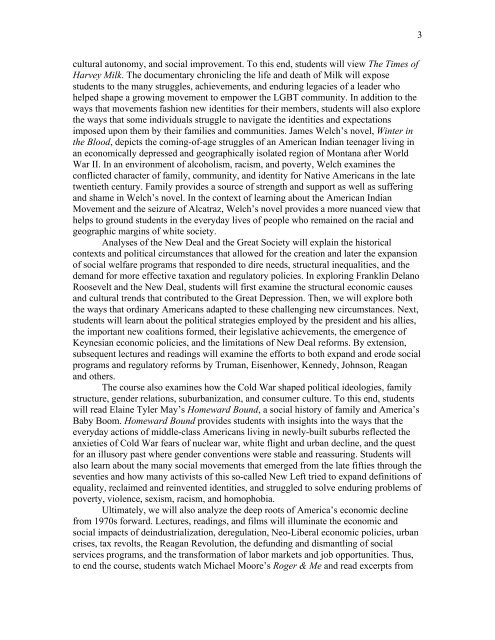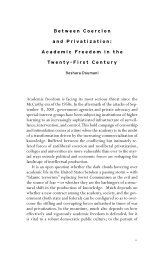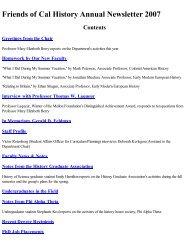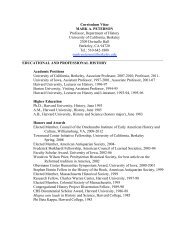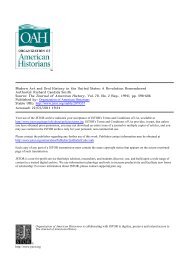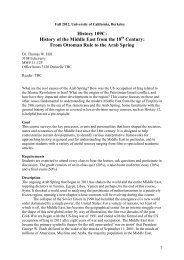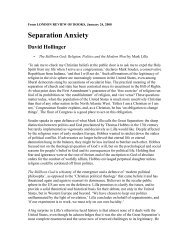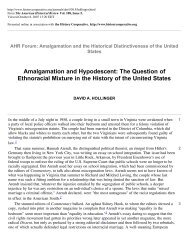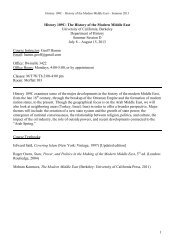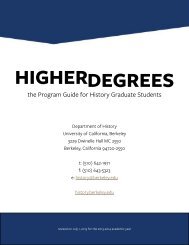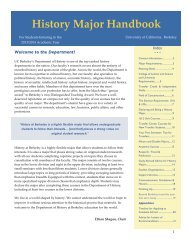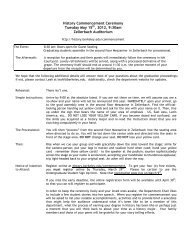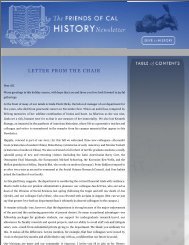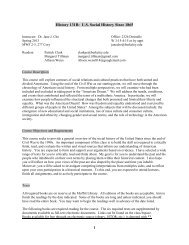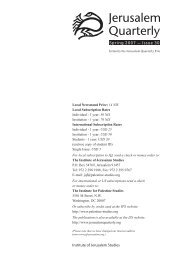Chester N131B Summer 2012.pdf
Chester N131B Summer 2012.pdf
Chester N131B Summer 2012.pdf
Create successful ePaper yourself
Turn your PDF publications into a flip-book with our unique Google optimized e-Paper software.
cultural autonomy, and social improvement. To this end, students will view The Times ofHarvey Milk. The documentary chronicling the life and death of Milk will exposestudents to the many struggles, achievements, and enduring legacies of a leader whohelped shape a growing movement to empower the LGBT community. In addition to theways that movements fashion new identities for their members, students will also explorethe ways that some individuals struggle to navigate the identities and expectationsimposed upon them by their families and communities. James Welch’s novel, Winter inthe Blood, depicts the coming-of-age struggles of an American Indian teenager living inan economically depressed and geographically isolated region of Montana after WorldWar II. In an environment of alcoholism, racism, and poverty, Welch examines theconflicted character of family, community, and identity for Native Americans in the latetwentieth century. Family provides a source of strength and support as well as sufferingand shame in Welch’s novel. In the context of learning about the American IndianMovement and the seizure of Alcatraz, Welch’s novel provides a more nuanced view thathelps to ground students in the everyday lives of people who remained on the racial andgeographic margins of white society.Analyses of the New Deal and the Great Society will explain the historicalcontexts and political circumstances that allowed for the creation and later the expansionof social welfare programs that responded to dire needs, structural inequalities, and thedemand for more effective taxation and regulatory policies. In exploring Franklin DelanoRoosevelt and the New Deal, students will first examine the structural economic causesand cultural trends that contributed to the Great Depression. Then, we will explore boththe ways that ordinary Americans adapted to these challenging new circumstances. Next,students will learn about the political strategies employed by the president and his allies,the important new coalitions formed, their legislative achievements, the emergence ofKeynesian economic policies, and the limitations of New Deal reforms. By extension,subsequent lectures and readings will examine the efforts to both expand and erode socialprograms and regulatory reforms by Truman, Eisenhower, Kennedy, Johnson, Reaganand others.The course also examines how the Cold War shaped political ideologies, familystructure, gender relations, suburbanization, and consumer culture. To this end, studentswill read Elaine Tyler May’s Homeward Bound, a social history of family and America’sBaby Boom. Homeward Bound provides students with insights into the ways that theeveryday actions of middle-class Americans living in newly-built suburbs reflected theanxieties of Cold War fears of nuclear war, white flight and urban decline, and the questfor an illusory past where gender conventions were stable and reassuring. Students willalso learn about the many social movements that emerged from the late fifties through theseventies and how many activists of this so-called New Left tried to expand definitions ofequality, reclaimed and reinvented identities, and struggled to solve enduring problems ofpoverty, violence, sexism, racism, and homophobia.Ultimately, we will also analyze the deep roots of America’s economic declinefrom 1970s forward. Lectures, readings, and films will illuminate the economic andsocial impacts of deindustrialization, deregulation, Neo-Liberal economic policies, urbancrises, tax revolts, the Reagan Revolution, the defunding and dismantling of socialservices programs, and the transformation of labor markets and job opportunities. Thus,to end the course, students watch Michael Moore’s Roger & Me and read excerpts from3


